Bohemian, colourful, diverse and in any way creative – neighbourhood Viertel in Bremen is associated with the alternative and cultural scene of this city. Variety of bars, creative spaces and hip shops creates a special environment for imaginative and alternative people to express their attitudes and positions. Actually, Viertel is not just a cultural space for young people, but also a dynamic political platform. If you walk through narrow and bright streets of Viertel, it is impossible not to notice the diversity of posters, stickers and graffiti, reflecting political climate of Bremen and also nearby cities like Hamburg and Hannover.

After a while you notice, that Viertel is a true battlefield of stickers and placards: there are plenty of them, and each chants different slogans and fights for different ideologies and beliefs. It seems, that every piece tries to speak to you and call for some action: “Support your local refugees”, “Time to be wild! “, “Nazis out!”, “Drop Whales Not Bombs!”. Indeed, fly-posting is a good way to communicate with passers-by as well as with ideological followers and even opponents.
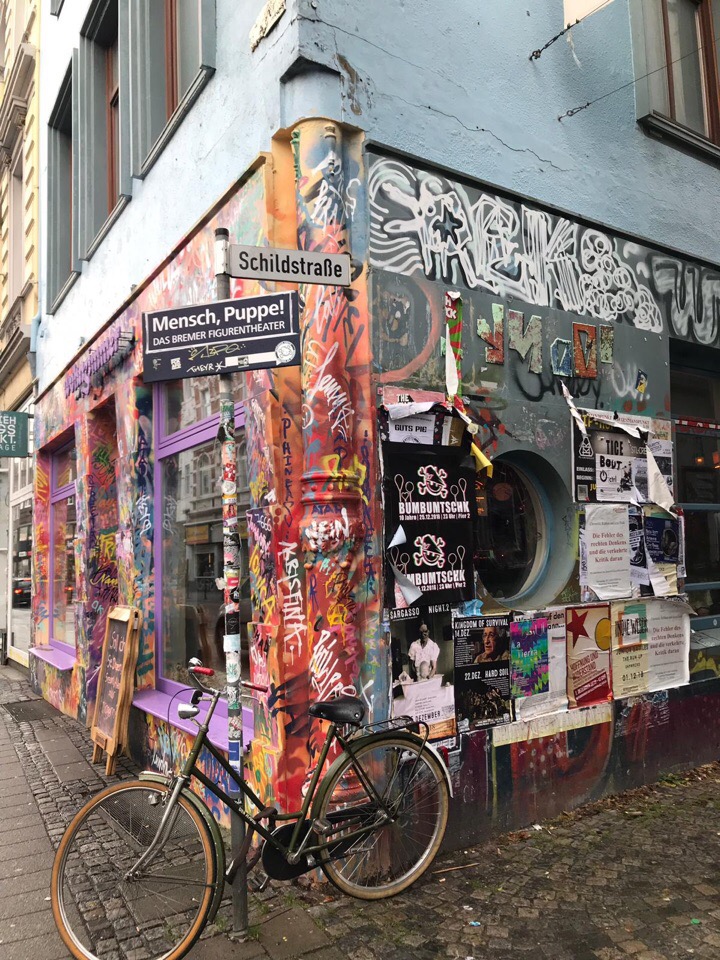
The Viertel’s space is mainly divided into 5 zones of political protests: feminist movement, environmental activism, football ultras, refugees support action, antifascist (or just antifa) and antiracist activities. This diverse ideological co-existence seems to be harmonic and in no way contradictory. Although topics and interests of each group of protests vary, altogether they create anti-discrimination and tolerant area, free of prejudices and full with colours.
The distribution of protests’ symbols is often uneven and changes nearly every week: once you recognise a wall occupied by, for instance, environmental posters and stickers, be sure, some days later it will belong to antifa or feminist movement. When you are not only a politically active passer-by, but also a researcher interested in protests nature and psychology, Viertel must be a perfect spot to explore traces of protest and their patterns.
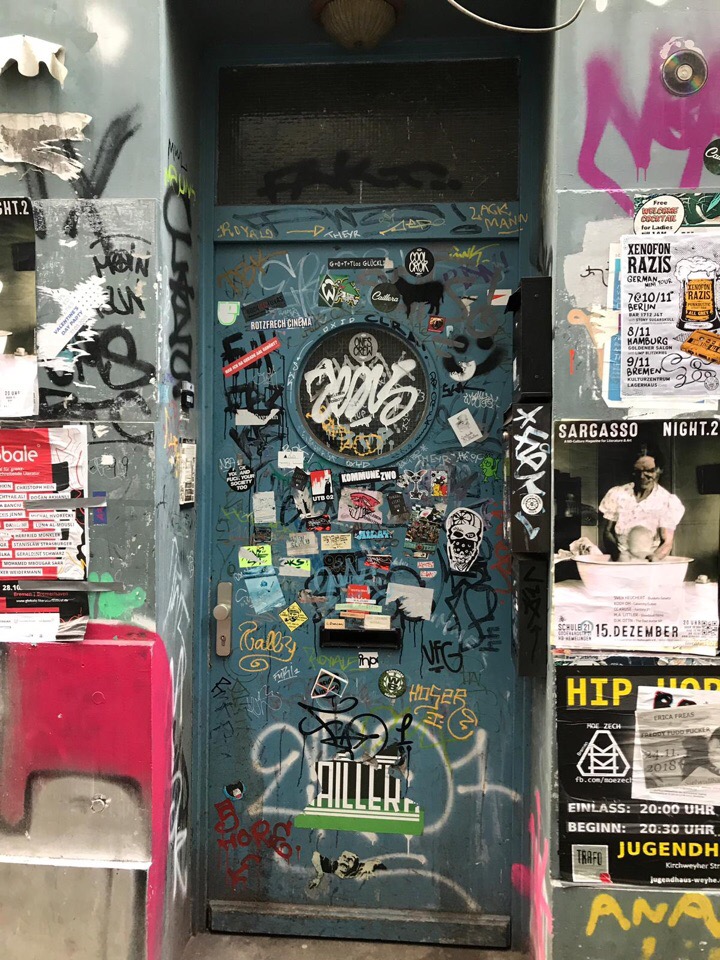
Since the fight with fascism and racism in Germany has been an essential and also controversial topic of the last decades, I would like to focus on it, observing traces and distribution of antifa movement in Viertel.
Necessary to keep in mind, that Viertel is an extremely colourful area and it is no wonder to see lots of anti-racist stickers just right after you have entered the neighbourhood.

‘My organisation remains nazi-free!’: Sticker of Jusos – youth political alliance founded by SPD (Social Democratic Party of Germany) 
Sticker of Redskins Washington, famous American football club
The first eye-catching sticker I have come across is ‘Racism leads to the lack of your empathy’.
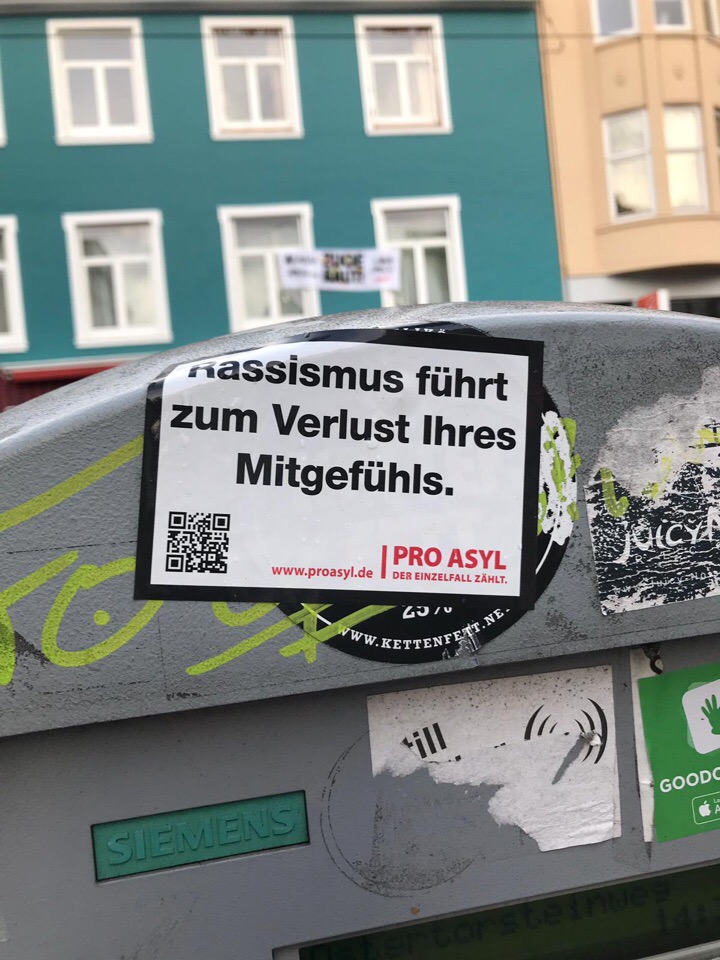
It belongs to PRO ASYL, biggest German organisation supporting immigrants and refugees. Although its head office is Frankfurt, their symbols are spread all over Germany due to good networking and connections with local organisations assisting refugees and promoting their rights. This movement concerns not only Germany, but also the EU entirely: the main aim of PRO ASYL is to overthrow a Fortress Europe policy, which restricts accepting refugees, and to improve conditions for integrating newcomers into European society.
No wonder to see lots of anti-racist and antifa stickers just right after entering colourful and diverse Viertel
Walking a bit further, one can notice two main movements in Bremen co-existing: Werder Bremen Ultras community and antifa.
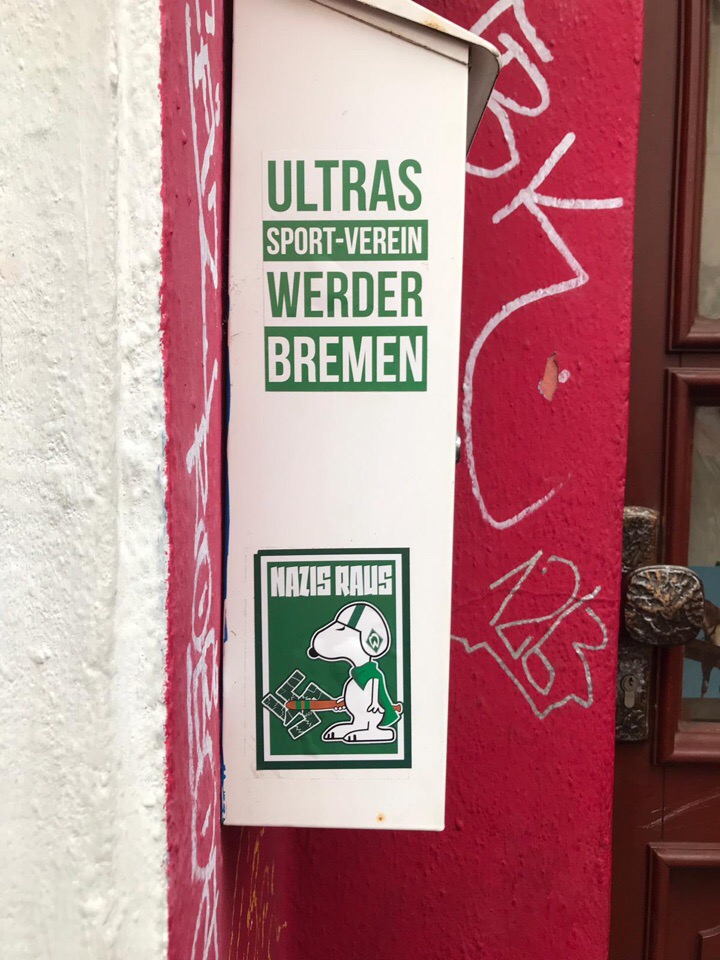
Football in Germany, as is known, is a kind of a religion. Local football club Werder Bremen is a connection point of all citizens: despite following different beliefs and political views, every weekend Bremen people share common love to the local team all together in bars and at the stadium. However, Werder Bremen is not only a beloved football club, but also a basis for many Ultras associations in the city. There are two main groups: Ultras Werder Bremen and Wanderers, and each of them follows antifa and anti-racist tradition. It caused plenty of confrontations with football hooligans, who share aggressive nationalism and even fascism ideas.
Last violent clash of Ultras Bremen and Hools happened in December 2017. After a match Werder Bremen vs. Mainz, Nazi-hooligans haunted Werder Ultras members and attacked them with iron bates. Nonetheless, Ultras clubs of Bremen keep fighting against nazism and racism not only in football, but also in the city and actually in the whole country. Even when it is at the cost of their safety.

The next stop I made on my way through Viertel was sticker “FCK AFD” on the street pillar.
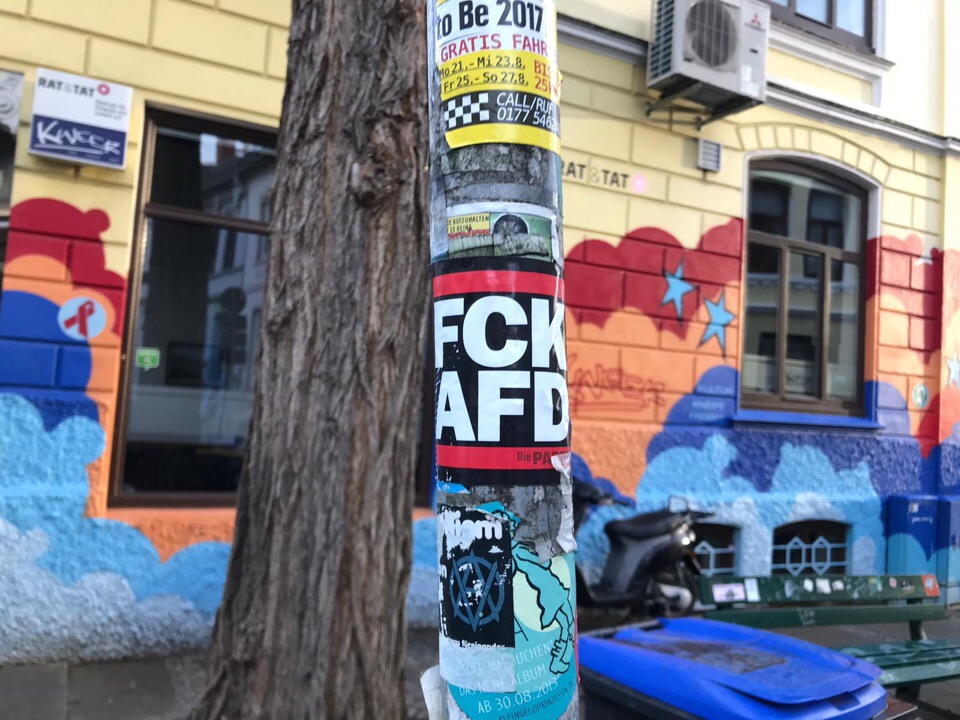
“Alternative für Deutschland” or AfD is a relatively new political party in Germany, but it has already made a splash all over Germany. Just after four years of its existence it has become one of the largest oppositional parties in the parliament. The only ‘problem’ with the party is, it is extreme-right and eurosceptic one. Among many German citizens this party is considered as neofascist, xenophobic and racist. Being incredibly popular in Eastern Germany, AfD has not found much support in the western regions, and in Bremen as well.
A Bremen neighbourhood, most actively opposing AfD, is Walle, since party’s office is located right there. However, Viertel shows resistance to the operation and rise of this party too. Bremen citizens strongly support anti-AfD movement not only within their city, but also in nearby Hannover. For instance, local political activists encouraged students to use their possibility to travel for free to Hannover via Semester Ticket and prevent a Party Congress of AfD.
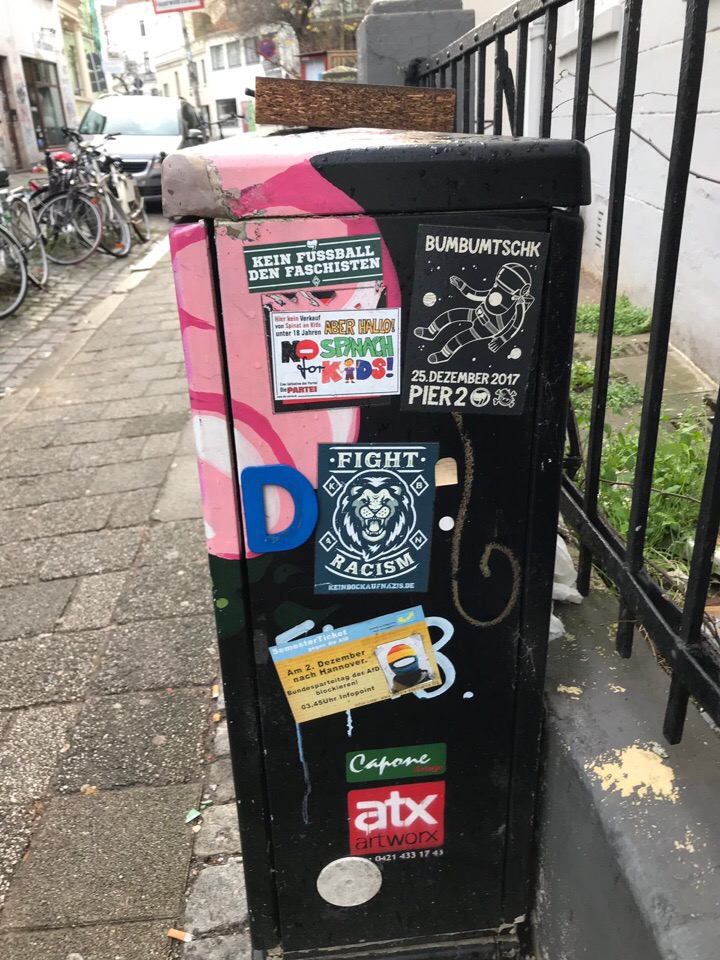
When you are done with walking across the noisy and busy central streets of this insane neighbourhood, it is possible to sneak into some quiet neutral streets around. But even here there are some hidden traces of protests to be found:

Surely, the most recognisable symbol of antifa resistance is flags, coloured black and red. “Antifaschistische Aktion” is the oldest movement against fascist and nazism in Germany and worldwide as well. It was founded in 1930’s and re-established in 1970’s as a response to increasing fascist attitudes.
This movement is considered to be anti-capitalistic and anti-establishment. However, it is decentralised and non-homogenous: there are many different groups under the slogan of antifa protest. Some of them fight against fascists, some against homophobic attitudes and others take all kinds of discrimination as fascism and struggle against it. Nevertheless, Antifaschistische Aktion is often critisised for many reasons. The main critique is justifying a violent approach to the property of rich people (Der Schwarze Block, for instance) or to their ideological opponents, primarily Neonazis and Ultra-rightists.

When your walk across Viertel is over, you realise, every sticker and poster has a deep background behind it. Another fact, that comes to mind, is lack of any nazi or racist symbols in the area. Racial bias is not welcomed here at all: tolerant attitudes in Viertel are strong indeed and this resistance is not going to be ended.
Sources:
1. Alternative für Deutschland. URL: https://www.afd.de/
2. Gerbaudo, P. (2014). Spikey posters: Street media and territoriality in urban activist scenes. Space and Culture, 17(3), 239-250.
3. PRO ASYL Deutschland. URL: https://www.proasyl.de/
4. Stern: Die Welt der Nazi Hooligans. URL: https://www.stern.de/sport/fussball/werder-bremen–die-welt-der-nazi-hooligans—und-wie-die-ultras-dagegenhalten-8472450.html
5. Wanderers Bremen. URL: https://www.wanderers-bremen.de/ueber/
Photo credits: Maria Leon
Text: Daria Fomina


